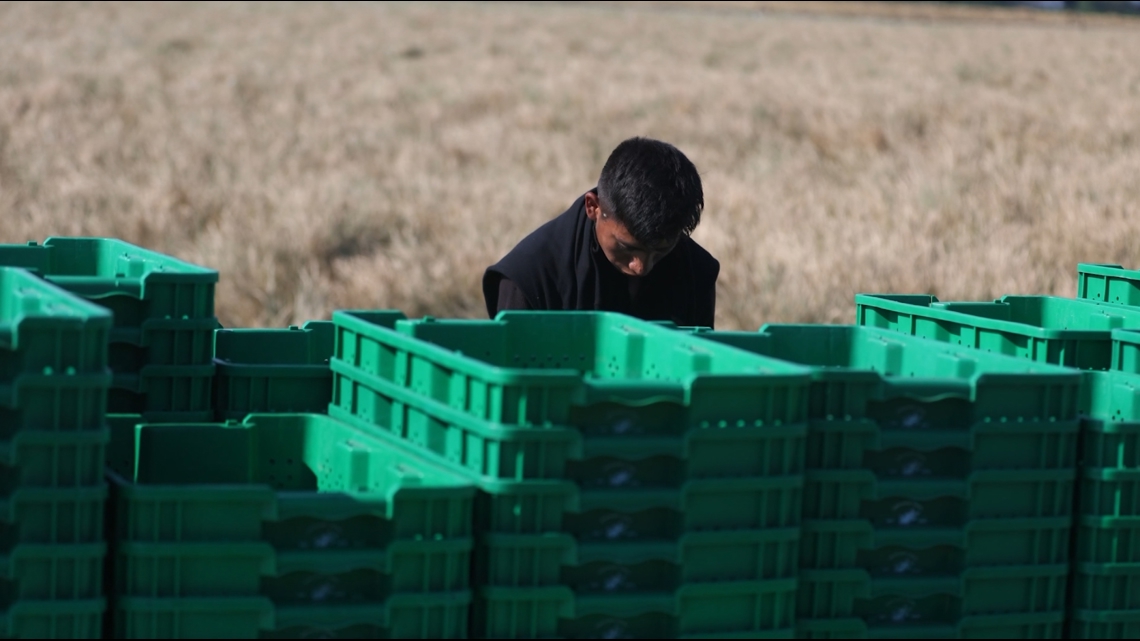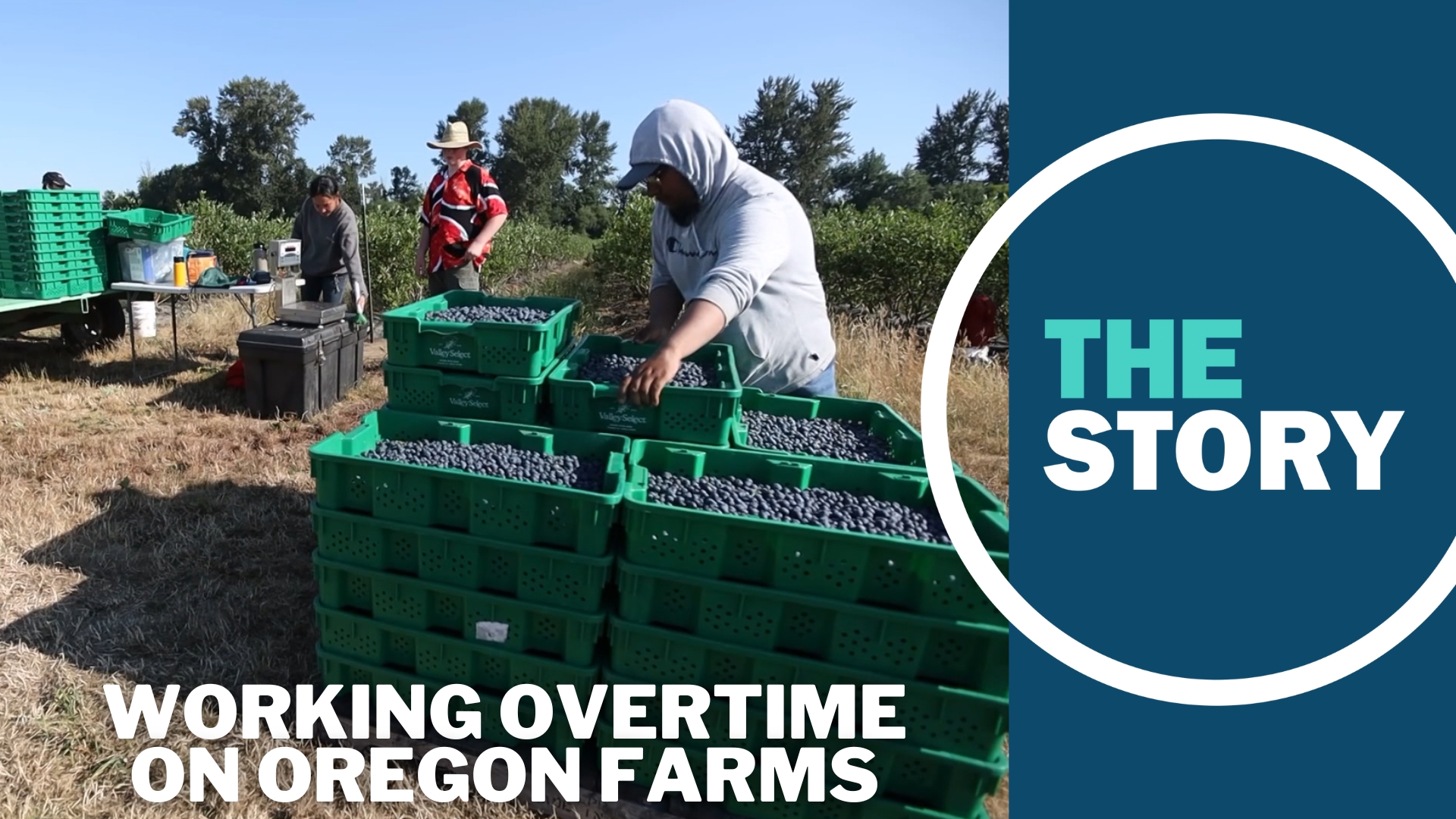ALBANY, Ore. — In 2022, the Oregon Legislature passed a landmark bill requiring overtime pay for farm workers. It gave employers a gradual ramp-up, so they won't be paying overtime after a 40-hour week until 2027. But since the beginning of last year, farms have needed to pay time and a half when workers exceed 55 hours.
On a sweltering day in early July, the temperatures on a 12-acre blueberry farm just north of Albany had reached 85 degrees by 10 a.m. Eighty pickers were quickly and carefully plucking blueberries from the branches.
Many of the workers were regulars who live close to the farm. They come back year after year to work for Anne Krahmer-Steinkamp. This year, the farmer expects that her workers will make less money than they are used to — she's sending them home after they hit 55 hours in a given week, so she doesn't have to pay those overtime wages.
"And it's obvious to you, but why does it have such a big impact on you?" The Story's Pat Dooris asked Krahmer-Steinkamp. "Because I can hear people out in the audience saying, 'In most other professions, if you work more than 8 hours, you do get time and a half and business is just to, you know, they plan for that.'"
"Yep. So in ag, we've never had overtime," she said. "A lot of people come work ag in the harvest time to pretty much make the butter on top of their biscuit. You know, this is where they make their extra money in the year-round that they can take home and spend it on extra stuff or help pay bills, stuff like that. But if we have to sit and we have to limit their hours, they don't get to help make that extra."
"What you're saying is that it's one thing to pay somebody 16 hours at straight time, but you can't pay them 8 hours regular time and then 8 hours time and that extra half? It's enough to make it unprofitable for you," Dooris offered.
"Very unprofitable," Krahmer-Steinkamp said.


Dooris met Krahmer-Steinkamp two years ago, as the Oregon Legislature debated on whether to end an exemption more than 80 years old that kept Oregon farm workers from earning overtime after putting in 40 hours a week.
Some members of the legislature were pushing hard to follow the example of Washington and California in enacting the change. Andrea Salinas, now a Congresswoman, was a member of the state legislature then and a leading voice in favor.
"I don't blame anybody today for setting that system up, but I do take responsibility for changing a system that was rooted in racism," Salinas said at the time.
The president of Oregon's largest farm workers union said the change would help farms keep good workers, the kind that do come back year after year.
"It's not only a matter of equity and dignity and respect, but if we do not implement something, we also fear that people are not going to- they're going to choose to go to Washington or not come back, especially our migrant farm workers, who are already saying, 'Hey, I get paid overtime in this other state and I'm questioning whether or not I'm gonna come back next year,'" said Reyna Lopez, president of PCUN, Oregon's largest farm labor organization.
The bill passed, with a gradual phase-in over a period of five years. It came with tax credits for farmers to help them adapt.
For the years 2023-24, farm workers must be paid time and a half for every hour over 55 hours worked in a week. In 2025-26, that threshold will go down to 48 hours. And at the beginning of 2027, the threshold will be 40 hours, just like most other workers.
Back in 2022, Krahmer-Steinkamp warned about the impact the law would have on her operation. Her workers are typically paid by the amount they pick. According to her, the average picker makes $18-20 an hour, and the top workers can make up to $40 an hour. She told Dooris that she's still worried about the law's impact.
"We've pretty much been working our workers to the 55 hours and then we send them home," she said. "So we've brought in extra people to help keep the hours down. We scheduled days off throughout the week and then me and my husband have been picking up the extra slack."
"What's that like?" Dooris asked.
"So, it's a lot of work. You know, I woke up at 3:30 this morning. And I probably will take phone calls 'til about 9:00 tonight," Krahmer-Steinkamp said.
The growing business
According to Krahmer-Steinkamp, the cost to grow a pound of blueberries is between 50 and 60 cents. The cost to pick, pack and ship that pound is roughly a dollar.
Her farm sells the berries to a wholesaler, which nets an average of $2 per pound. That leaves her with 40 cents per pound to squirrel away for supplies, expenses and savings for the next year.
To avoid paying overtime, Krahmer-Steinkamp said she brings in extra workers. More people are getting paid, but she said her regular workers are making less money than they did before.
"It has gotten a little bit harder now that we have to cut people, so the guys don't like it," she said. "A lot of these guys are used to working, you know, 60 to 80 hours (a week) in the summertime, because that's what we've been doing for years and years, and that's where they make that gravy on top of the biscuit — and now they don't get that."


"Has it been hard to find the extra workers?" Dooris asked.
"It's been hard to find, like, specific workers — like that can do forklifts, drive machines, truck drivers, that kind of thing," Krahmer-Steinkamp said. "Just regular manual labor, we haven't had problems with that."
This outcome of farmers cutting workers loose to avoid overtime is not new, and it's not unique to Oregon. The Sacramento Bee reported in December 2023 that the same thing was happening in California after the state's farm worker overtime law went into effect.
Ira Cuello-Martinez is the policy and advocacy director for PCUN. According to him, it's too soon to tell how many farm workers are earning less because of the new law.
"I think what you are saying is, you're not convinced, really, that it's happening on a wide scale," Dooris said.
"That is correct. We're not convinced that farmworkers are being impacted in a negative way across the state," Cuello-Martinez said. "l think there's a lot of different experiences and a lot of different decisions and factors at play. But at the end of the day, it's too early to tell on our end."
But a spokesperson for the Oregon Farm Bureau said that farms and ranches across the state are doing all they can to avoid paying overtime wages.
"I would say they're paying as little overtime as possible because they don't have an ability to recover those costs," said Jenny Dresler. "However, some are bringing in additional workers. Some are just lowering their productivity and deciding not to grow certain labor-intensive crops. Others are mechanizing — I've heard from quite a few operations that have invested in machines that can do that work and have actually resulted in significant cost savings."
Krahmer-Steinkamp insists that farmers aren't avoiding overtime because they want to punish workers, but they simply can't afford to absorb the cost.
"I think they picture it as more of like manufacturing, where they can raise their prices and take in that overtime cost," she said. "But they forget that farmers are a price taker, so our fresh price changes every week."
"And you mean the price that you're being offered by the people who are going to buy your berries?" Dooris asked.
"The price I'm being offered for my fruit changes every week," Krahmer-Steinkamp agreed. "And I have no control (over it)... I can't say, 'Hey, I need more money because I'm going to have to pay overtime,' and they're going to laugh at me and say, 'Nope. This is what we're offering.'"
According to Krahmer-Steinkamp, other farms are avoiding overtime as well, so there's no effort for Oregon farms to collectively push for higher rates from buyers.
"I talked to a bunch of growers throughout the year," she said, "and there was a little bit of overtime in the spray season, a little bit of, like, main guys in the summertime — and that's about it."

